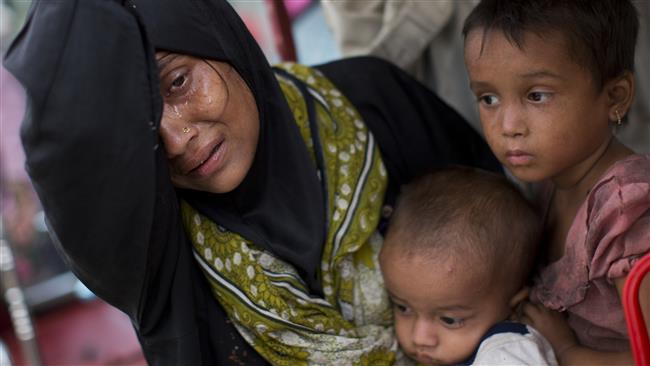
RNA - Women, many with babies on their shoulders, stood in torrential rain in the hope of getting food, tarpaulin and clothes distributed by local Bangladeshi people, Al-Jazeera reported.
Chaos was all around at Balukhali, where a large number of Rohingya have taken refuge, as the rain added misery on the persecuted community.
More than half of the estimated 412,000 Rohingya, who have escaped Myanmar's military crackdown, live in makeshift sites without proper shelter, clean drinking water and sanitation.
On Sunday, police and army officials were checking vehicles coming from the camps towards Cox's Bazar city, a day after the Bangladesh government announced restrictions on the refugees' movement.
Arefa, along with hundreds of fellow Rohingya, was among the crowd waiting for the much-needed aid.
She was drenched, holding her two-year-old daughter Minara on her shoulder. Arefa was crying. She said there was no food for her and her two children.
"I do not have food, no shelter and no way to cook anything. I have yet to get any relief," she said with tears pouring down, adding that "If I get aid I eat, otherwise I go hungry."
Arefa, who arrived here two days ago from Lambaguna village in Akyab district, said she is 40, but she looked much younger. Her husband, Nabi Hussain, was shot dead by the Myanmar military, she added.
A fellow Rohingya offered her a small tarpaulin tent until she arranges her own. But at the private aid distribution centre in Balukhali, she had little luck.
Since October 2016, Myanmar’s government has laid a siege to the western state of Rakhine, where the Rohingya Muslims are concentrated. There, horrific violence, including killing, rape and torching property, has been taking place against the minority Muslims, according to reports and eyewitnesses.
The attacks have seen a sharp rise since August 25 after dozens of police and border outposts in Rakhine came under attack purportedly by a group claiming to be the defenders of the Rohingya. The alleged assaults were launched in response to a government clampdown in the area, where over a million Rohingya are based.
Rohingya Muslims fleeing violence and persecution in their home country of Myanmar continue to arrive in Bangladesh. Refugees are waiting for handout from aid agencies since they lack food, clean water and shelter. Locals say many of the Rohingya refugees are also sick and wounded. Thousands of the displaced people have been stranded or left without enough food for weeks.
The United Nations says so far more than 400,000 desperate Rohingya Muslims have fled the violence in Myanmar and crossed into neighboring Bangladesh.
Myanmar’s government denies full citizenship to the Rohingya, branding them illegal immigrants from Bangladesh. Dhaka, in turn, regards the desperate refugees as Myanmarese and harshly pushes them back. The Rohingya, however, track their ancestors many generations back in Myanmar.
847/940